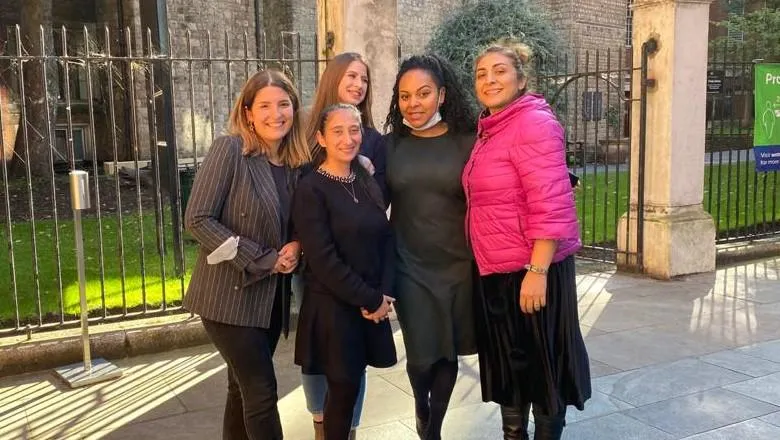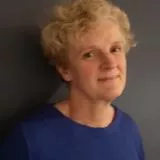For me, applying for Pre-Settled Status was very simple: I am a student, I speak English, and I have a laptop. Obtaining Settled Status is more complicated anyway, and obviously for someone who is older, and doesn't speak English, or perhaps doesn't even read - which is the case for some people in the community - there are significant barriers.
Ilinca Tuvene
06 May 2022
Legal Clinic students help homeless Roma apply for legal residence
Students from King’s Legal Clinic have taken part in a pilot project, supporting street homeless people from the Roma Community to help them apply for legal immigration status, and so access essential services.

The Roma Support Hub is a pilot project developed by Roma Support Group, an organisation supporting the rights of the homeless Roma community in central London, alongside human rights law firm Deighton Pierce Glynn (DPG), European citizens’ rights organisation AIRE Centre, Caritas Westminster, and King’s Legal Clinic (Human Rights and Environment Clinic).
Following the UK’s exit from the European Union, citizens of EU member states, and those of a small number of other European countries, had to apply for either Pre-settled or Settled Status if they wanted to remain legally resident in the UK. The deadline to apply to the European Union Settlement Scheme (EUSS) was 30 June 2021. Applications can still be made, but applicants need to have reasonable grounds for their delay in applying. The Roma Community are amongst the most discriminated against in mainland Europe, often socially excluded from education. They have travelled to London to find work in order to survive but often face human trafficking and labour exploitation, and end up on the streets.
Two King’s students, Darius-Farid Jahani (3rd year, LLB) and Ilinca Tuvene (4th year, Politics, Philosophy and Law), and alumna Andreea-Marinela Popovici (LLB, 2021), worked with members of the Roma Support Group to approach members of the Roma community sleeping rough in London’s West End. The Clinic members, all of whom are Romanian, acted as interpreters, encouraging those they met to attend the community centre at Farm Street church where legal support (and lunch) could be provided.
Darius-Farid Jahani said: “The charity that runs the soup kitchen told us that some of the Roma people had previously come to the lunch club, but because of the language barrier they stopped coming. So we tried to establish a connection, to build trust, and then - having got them to the lunch club - we could start working with them and the solicitors on their EUSS applications.”
Ilinca Tuvene, who had been through the process of applying for Pre-Settled Status herself, was aware how the experiences of these people differed from her own.
“They might not have been aware of the Settlement Scheme, they might not have been able to apply, or it might just not have been a priority at the time because they were trying to sort out other things.”
In 2014, a study by the European Agency for Fundamental Rights found that 20% of the Roma respondents reported that they could not read, compared to 1% of non-Roma respondents.
While the Roma Support Hub project was primarily designed to support rough-sleeping Roma clients in applying to the EUSS, it also tackled wider issues such as help with finding housing and healthcare.
Ilinca: “If you don’t have legal status, it's a barrier to everything - legal, lawful employment, housing. So the idea was to get these people to first apply to the Scheme and then to help them further.”
The Clinic members received training from the AIRE Centre and DPG on the Settlement Scheme, and conducted additional research on how it was applicable to their clients.
Through my involvement with this project, I definitely developed my legal skills and my knowledge of the EUSS, but I think one of the most important things was learning how to communicate with, and relate better to, clients. That was a big challenge at the beginning because there is a kind of gap in terms of understanding, but I think we managed to inform people and to help them both with their applications and, in some cases, with more than that.
Darius-Farid Jahani
Ilinca: “It was really important to have people who could speak Romanian because none of the clients would be comfortable doing any of this in English. At the beginning, I was quite worried because I've never been in that position. How do you relate without being phony? How can you tell them, ’I know what you're going through’ when you don't.”
It was a very moving experience. The people were lovely and actually quite trusting. What really struck me was how used they were to being discriminated against and that broke my heart.
Ilinca Tuvene
Sue Willman, Assistant Director of the Legal Clinic said: “It was shocking to encounter Roma families and single older women sleeping rough in the heart of London’s Mayfair. The law students’ efforts supporting this initiative have not only helped ensure that some of those people now have access to housing and healthcare, but also led to a longer-term funded initiative to provide much needed support and legal advice.”

